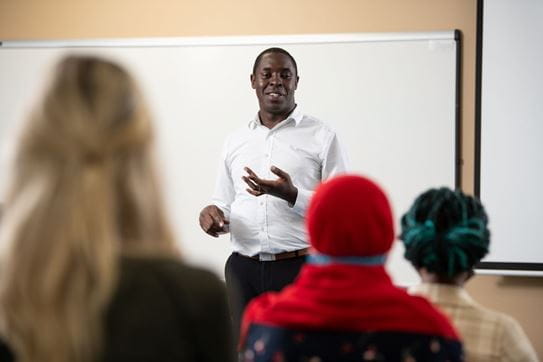Improving cancer screening and prevention for immigrants and refugees
Dr David Busolo has always been passionate about research that directly impacts his community. Growing up in Kenya and working with cancer patients during his undergraduate training led to his interest in supporting immigrants and refugees through cancer-related work. During his doctoral studies, he examined their experiences accessing healthcare in Manitoba. Now an associate professor at the University of New Brunswick, Dr Busolo has focused his research on improving cancer screening and prevention efforts for these groups.
“As an immigrant to Canada, I encountered many challenges during the settlement process, similar to those faced by some of the immigrants who participate in my research studies,” Dr Busolo shares. “Coming from a family where my dad had a prostate cancer scare, I live knowing the importance of early cancer screening and detection as a critical factor for preventing most cancers. For this reason, I am passionate about working with marginalized populations, such as immigrants and refugees to find ways to improve their cancer screening rates.”

Healthcare barriers for Arabic-speaking refugee women
Breast cancer is the most commonly diagnosed cancer and the second leading cause of cancer-related death among women in Canada. Fortunately, the mortality rate for the disease has decreased by 40% since the early 1990s. Part of the reason for this decrease are improved treatments and early detection through organized mammography screening programs.
However, Arabic-speaking refugee women in Canada experience barriers within the healthcare system, often resulting in difficulty getting mammograms.
With funding from the Canadian Cancer Society, Dr Busolo and his team aim to improve access to breast cancer screening for Arabic-speaking refugee women in New Brunswick. The research study is a collaborative effort with Arabic-speaking refugees, health and services providers to understand these barriers and create strategies to improve access.
“Our research has identified several key challenges, including cultural differences, language barriers, and the lasting impact of trauma, all of which negatively affect their willingness and ability to seek healthcare,” Dr Busolo says. “Furthermore, inadequate transportation options and emotional barriers – particularly fear – exacerbate these difficulties.”
The funding for Dr Busolo’s research could help impact future work with other immigrant and refugee populations.
The Arabic-speaking immigrant and refugee community, research team, and I are very grateful to all the donors for supporting our research. We have a lot of work to do, and your support will go a long way to extend cancer preventative efforts in New Brunswick. We know you had many choices to make towards donating, but you chose the Canadian Cancer Society. To that, I say thank you.
The future of breast cancer screening for immigrants and refugees
Dr Busolo and his team expect that making sure that everyone has access to mammography screening will include prioritizing community engagement, cultural sensitivity and trauma-informed care.
“I envision continuous education for healthcare providers on cultural safety and trauma-informed practices, improved language support systems, and the integration of community health workers or navigators from immigrant and refugee backgrounds to bridge language and cultural gaps,” Dr Busolo says.
Looking ahead, I hope to see a healthcare system that re-examines and re-imagines its strategies for engaging immigrant and refugee patients […] My mantra is: 'It is in our hands to make the lives of the people and communities we live in better, one life at a time. If I could help save one life, I would save a generation.’
